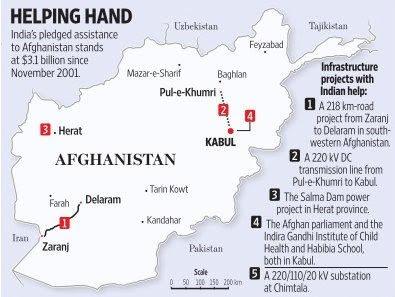International Relations
India’s Assistance to Afghanistan
- 25 Nov 2020
- 5 min read
Why in News
Recently, at the Afghanistan 2020 Conference, India has announced about 150 projects worth USD 80 million.
- Afghanistan’s President, officials from the United Nations (UN) and the European Union (EU) officials, besides representatives of other countries, attended the conference.
- Also, the USA has decided to reduce its troop presence in Afghanistan to about 2,500 by January 2021.
Key Points
- India’s Current Assistance:
- India will launch phase-IV of high-impact community development projects, which include around 150 projects worth USD 80 million.
- It has signed an agreement for building the Shahtoot dam, which would provide safe drinking water to 2 million residents of Kabul city.
- It builds on the 202 km Pul-e-Khumri transmission line of 2009, through which India provides power to the city.
- Earlier Assistance:
- India’s development programmes in Afghanistan are focused around five pillars:
- Large infrastructure projects.
- Human resource development and capacity building.
- Humanitarian assistance.
- High-impact community development projects.
- Enhancing trade and investment through air and land connectivity.
- Since 2001, India has committed USD 3 billion towards rebuilding and reconstruction of Afghanistan.
- Chabahar Port in Iran, which provides alternate connectivity to Afghanistan.
- Afghanistan’s growth has been constrained by its landlocked geography and Pakistan blocking transit access made the situation even worse.
- Pandemic Support: India sent more than 20 tonnes of medicines, other equipment and transported 75,000 tonnes of wheat to Afghanistan to address the Covid-19 challenge.
- India’s development programmes in Afghanistan are focused around five pillars:
- Shift in Indian Perspective:
- The Indian government’s decision to invest in Afghanistan’s future, where the Taliban is set to play a dominant role, is being seen as a major departure from the past.
- India also participated in the commencement ceremony of the intra-Afghan talks in Doha in September 2020, where a 21-member Taliban team was also present. It reflects India's realisation of ground realities and shifting sands in Kabul’s power structure.
- The Indian government’s decision to invest in Afghanistan’s future, where the Taliban is set to play a dominant role, is being seen as a major departure from the past.
- Reduction of Troops by USA:
- In February 2020, the USA and the Tabilan signed an agreement in Doha, (Qatar’s capital).
- According to it, the USA would withdraw all of its troops from Afghanistan in 14 months and would also release Taliban prisoners, held captive by the Afghan government.
- In return, the Taliban assured that they would not allow transnational jihadist organisations such as al-Qaeda and the Islamic State to use Afganistan as their base and also committed to start direct talks with the Afghan government, which began in September 2020.
- With the USA leaving at such a crucial point, it not only deprives Afghan forces of the support they need, particularly the airpower, but also affects their morale.
- The North Atlantic Treaty Organization (NATO) has committed to funding Afghan troops for four more years.
- However, this decision will leave Afghanistan with an uncertain future as the Taliban is expected to take over after the troops’ withdrawal.
- The Taliban, who were ousted from power in 2001 after the USA invasion, have since been fighting both foreign troops and the Afghan government.
- It now controls more than half of the country and contests the whole of it.
- Since the agreement was signed, the Taliban have conducted more than 13,000 attacks nationwide.
- According to a UN Assistance Mission in Afghanistan (UMAMA) report in October 2020, nearly 6,000 Afghan civilians were killed in the first nine months of the year and 45% of the deaths were by the Taliban.
- In February 2020, the USA and the Tabilan signed an agreement in Doha, (Qatar’s capital).
Way Forward
- The increasing level of violence in Afghanistan is a pressing concern. However, in spite of the challenges, both sides (the government representatives and the Taliban) remain at the negotiating table, and appear to have reached an early breakthrough.
- India calls for an immediate and comprehensive ceasefire and also believes that the peace process must be Afghan-led, Afghan-owned and Afghan-controlled.
- India looks forward to walking hand in hand with the people of Afghanistan and the world community to work towards a peaceful, prosperous, sovereign, democratic and united Afghanistan.







